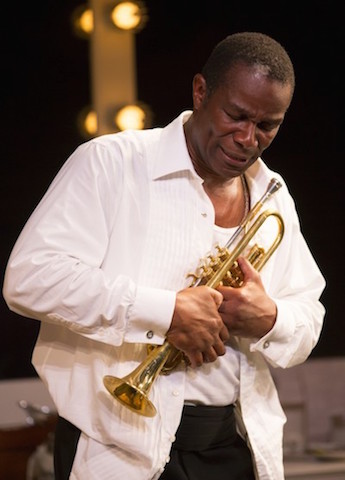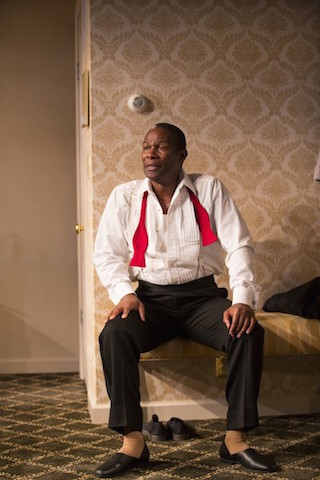
John Douglas Thompson in ‘Satchmo at the Waldorf.’ (T. Charles Erickson Photo)
For many people, Louis Armstrong is remembered as one of jazz music’s greatest trumpet players, famous for crossing the color barrier in what was a racially divided America.
Despite his accomplishments, Armstrong was famously and frequently criticized by Blacks for being an Uncle Tom, rarely using his unique position to speak out about race. Despite his fame and success, the person he really was, his personal life, remained a mystery to most.
Written by author and drama critic Terry Teachout, Satchmo at the Waldorf aims to show the world a different side of Armstrong, one who was anything but complacent about the state of race relations in America during the civil rights movement.
“Many people thought his ideas about politics were leaning towards something very conservative, but he was not, he was very liberal,” said John Thompson, star of Satchmo at the Waldorf.
The play, which opens on May 26, and runs until June 3, at The Wallis Annenberg Center for the Performing Arts, begins with Armstrong reflecting on his life after one of the final performances of his career. The nature of the play required Thompson to inhabit three different roles, Louis Armstrong, Armstrong’s Jewish manager Philip Glaser and Miles Davis.

John Douglas Thompson as Satchmo. (T. Charles Erickson Photo)
“It’s just you,” Thompson said. “So it requires a great deal of physical emotional rigor and focus.” The addition of Davis, who Thompson noted makes up about 10 percent of the play, served to fulfil the Uncle Tom narrative that shadowed Armstrong throughout his career. But it’s the complex relationship between Glaser and Armstrong that drives much of the story.
“Having an African American actor play a white Jewish lawyer creates a tremendous sense of irony and interest,” said Gordon Edelstein, director of the play. “Even though he (Glaser) loved his artists, he definitely had some bigotry inside of him.”
Thompson notes that irony aside, the relationship between the two was indeed complicated. Race, Armstrong’s need for a father figure, and Glaser’s push to commercialize Armstrong’s music all contribute to the relationship. “These two men cared deeply for one another, but there were times they didn’t get along with one another,” he said.
After writing a book about Armstrong entitled, Pops: A Life of Louis Armstrong, Teachout found himself wanting to know more about the famous musician, his inner drives and decisions as well as his interpersonal relationships. After writing a book about Armstrong entitled, Pops: A Life of Louis Armstrong, Teachout found himself wanting to know more about the famous musician, his inner drives and decisions as well as his interpersonal relationships.
“For many white people in America, he was very likely the first black person they loved,” Teachout said. “He was the joyous entertainer who sang ‘Hello, Dolly!’ and ‘What a Wonderful World’ and made millions of people feel warm inside—but Satchmo at the Waldorf is also about the private Armstrong, who swore like a trooper and knew how to hold a grudge.” Understanding, it seems, is what’s at the heart of the play.
“People often see a particular person’s glory, but they never see the backstory, how that was created,” Thompson said. “I came to this whole story pretty naïve. Thinking he was an Uncle Tom.” “I was of the camp of many Black Americans who didn’t understand his impact and I came away from this with a renewed understanding of his unique contributions,” Thompson said. Tickets are available at www.thewallis.org, by calling 310-746-4000, or in person at The Wallis
Ticket Services located at 9390 N. Santa Monica Blvd., Beverly Hills, CA 90210.






